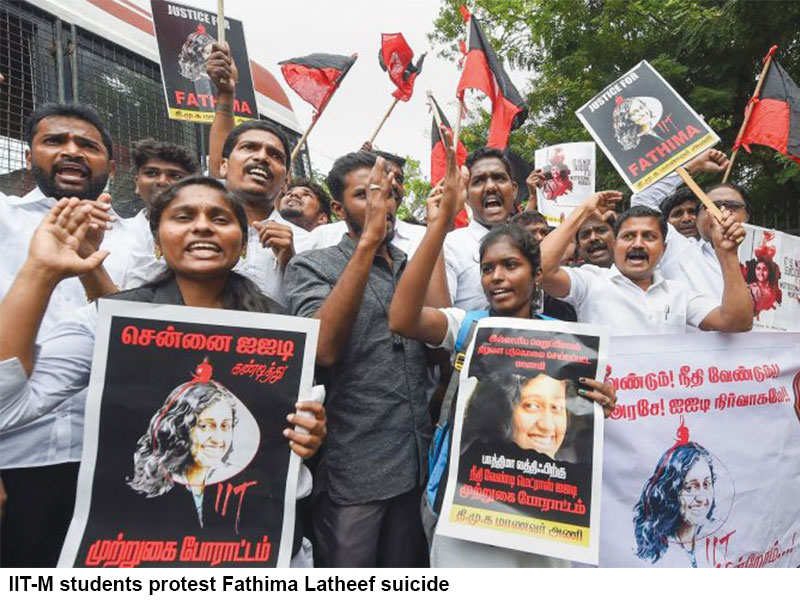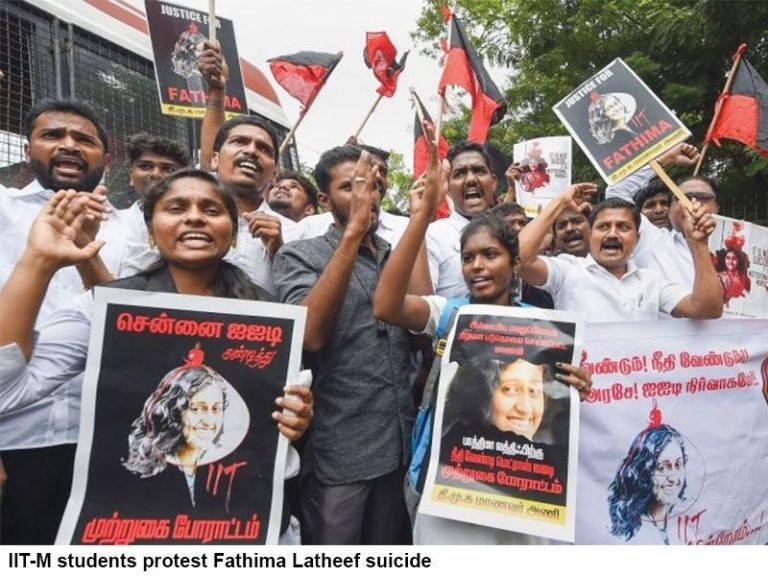Tamil Nadu — Suicides epidemic cloud
 -Hemalatha Raghupathi (Chennai)
-Hemalatha Raghupathi (Chennai)
The tragic suicide of Fathima Latheef (19), a first-year student of the five-year integrated humanities and development studies postgraduate programme, on the campus of the top-ranked Indian Institute of Technology-Madras (IIT-M, estb.1959) on November 9 — the fifth student suicide in this institute during the past 12 months — has deeply embarrassed the management of this Central government-promoted globally renowned institute of multi-disciplinary higher learning.
Fathima’s suicide and her poignant phone messages naming three professors in the humanities department for being responsible for her death, have generated a national furore on mass media and triggered relentless trolling of the institute on social media alleging harassment and Islamophobia. Students’ organisations in IIT-M have launched campus protests and political parties have jumped into the fray demanding justice for Fathima. Meanwhile, the case has been transferred to the Central crime branch of the Tamil Nadu state government and the accused three faculty members are being interrogated by the police.
Fathima’s suicide is the fifth in 12 months on the sprawling 620-acre IIT-M campus which houses 10,299 students and 631 faculty. A final-year student of ocean engineering from Kerala committed suicide in September 2019; a first-year M.Tech student from Uttar Pradesh and a research scholar from Jharkhand took their lives in January this year, and an assistant professor recently took this extreme step in the staff quarters.
The IIT-M management is dismayed because this vintage institute which hosts humanities and business faculties apart from engineering, has a reputation to lose. It is ranked the #1 engineering institute countrywide in the National Institutional Rankings Framework (NIRF) 2019 of the Union government and #3 countrywide in the QS India University Rankings 2019.
Fathima’s suicide has created greater embarrassment for the IIT-M administration because there’s widespread suspicion on social media even if not in IIT-M itself, that Fathima was driven to suicide because of the Islamophobia of some faculty members. According to her father Abdul Latheef, a Kerala-based Muslim who works in Saudi Arabia, his daughter had complained about faculty members subjecting her to religious discrimination and harassment.
Fathima left no suicide note and even her cell phone messages don’t detail any specific charges, except alleged “harassment”.
On its part, the IIT-M management is tight-lipped on the ground that the case is sub judice. On November 15, it issued a statement in which it appealed to the media to “desist from coming to conclusions till the enquiry is completed”. “As soon as the incident came to the knowledge of the IIT-M authorities, the police was immediately informed by the institute. IIT-Madras is committed to do whatever is required as per law, and ensure fair play,” says the statement.
Speaking on condition of anonymity, an IIT-M professor ridicules the Islamophobia charge against faculty members. “This is a 60-year-old institution which has graduated thousands of Muslims and minority community students. This unfortunate girl was from a very sheltered, protected background who couldn’t cope with the rigours and independence of hostel life. The Islamophobia charge is political mischief,” says an irate professor.
“It’s absurd to allege religious or caste-based discrimination against faculty members. These are highly educated intellectuals beyond such prejudices. However, academic programmes are very demanding and students have to work hard and continuously to earn good grades and secure best placements. Moreover, expert counselling services are available at the institute,” adds Samyak Jain, who graduated from IIT-M this year.
Yet the students’ community is less sanguine. They have formed a joint action committee which urges the administration to implement three main recommendations proposed by the student legislative council. These include constitution of an external expert panel to survey the overall mental well-being of students, and particularly pressure exerted on students from marginalised social backgrounds and women; establishing a grievance redressal cell in each department and conducting an internal probe into the allegations made by Fathima’s family. The IIT-M administration has accepted only the first two demands.
Nevertheless, Fathima’s tragic suicide should serve as a wake-up call for the IIT-M management. The hard reality is that it’s not sufficient to recruit best faculty. Counsellors, psychiatrists and health workers also need to be carefully recruited and trained.
Also Read: Teen suicides act now!















Add comment